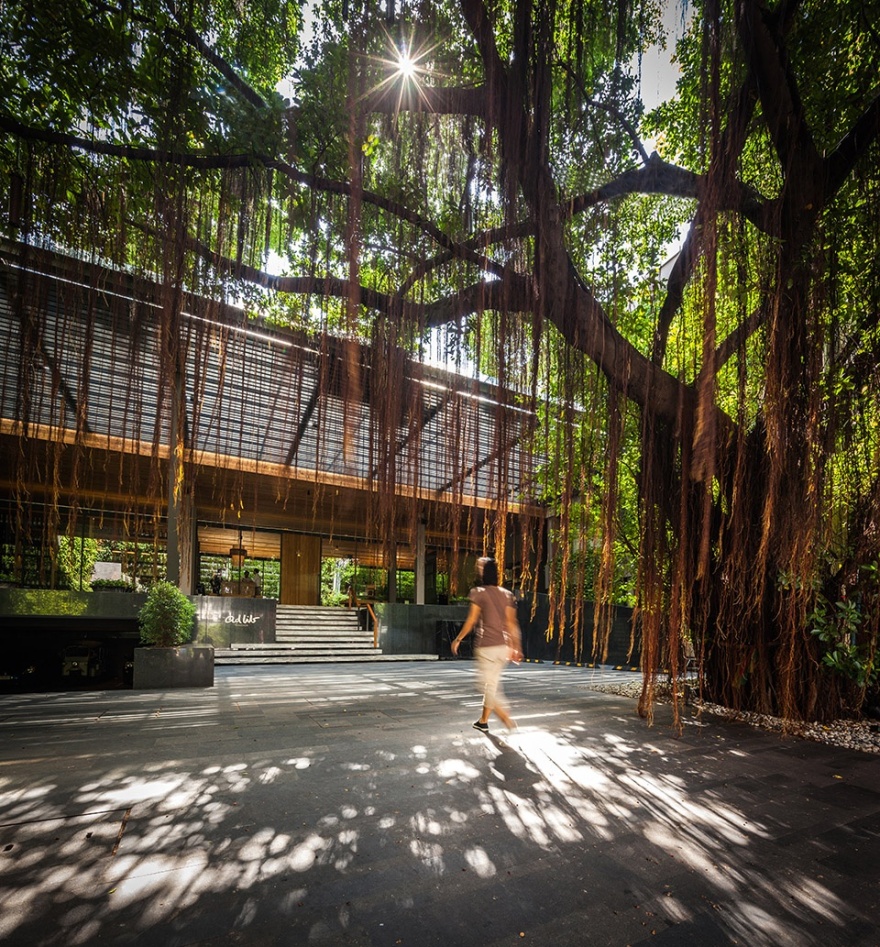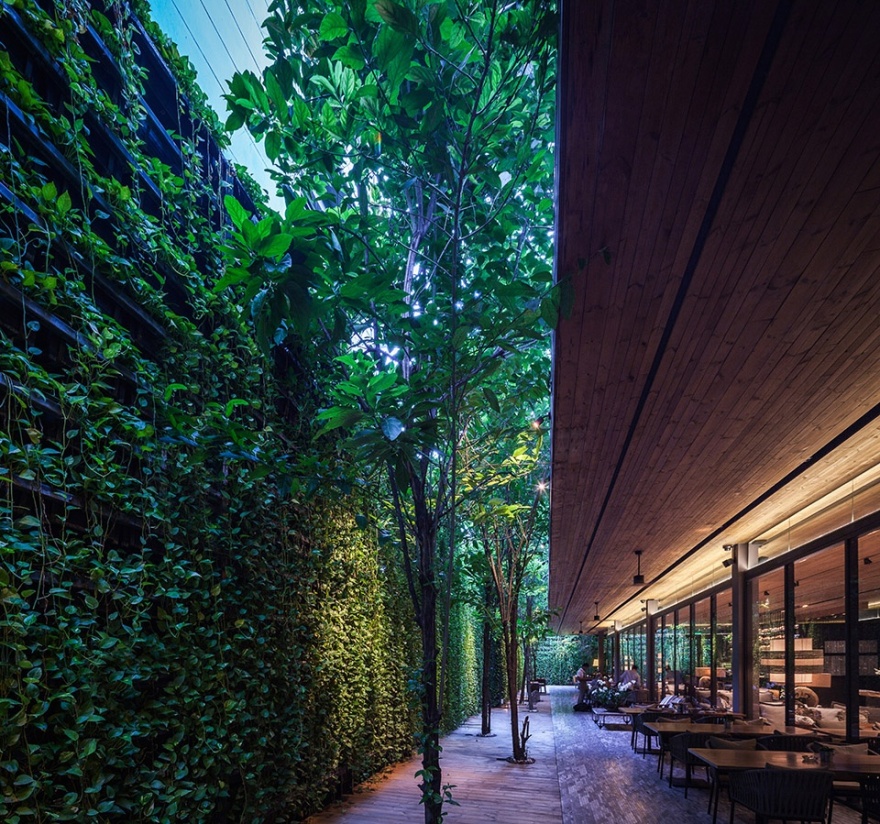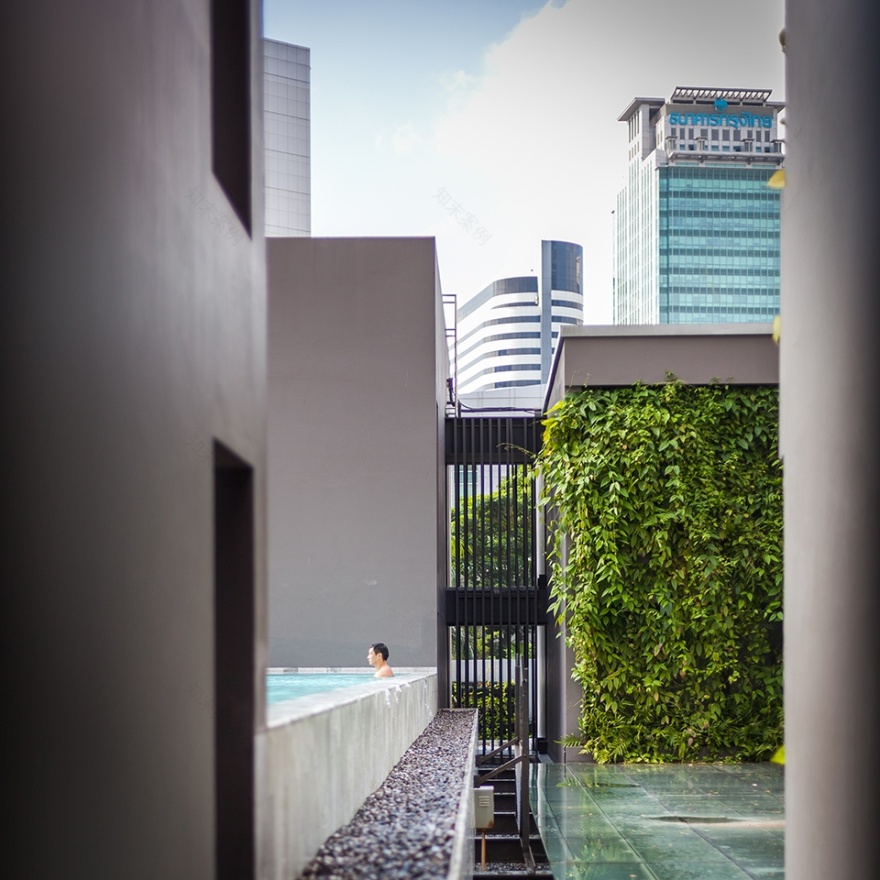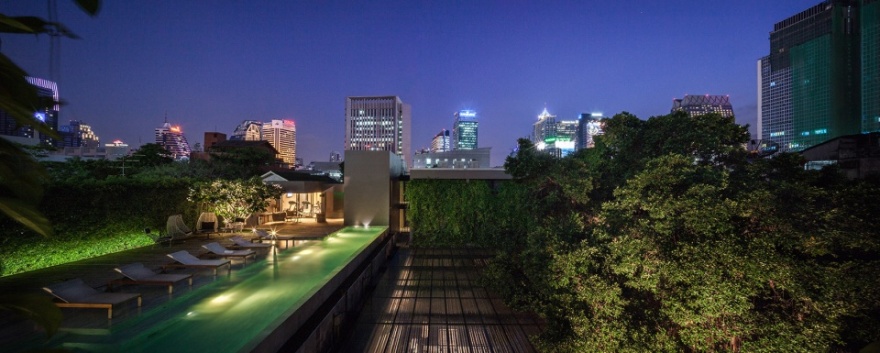查看完整案例

收藏

下载
项目概述 | Project Statement:
该项目旨在将位于曼谷繁忙街区的一座闲置排屋改造为一间长住酒店。场地位于一条封闭的巷道里,周围的风景几乎没有任何可观性。因此,景观设计师们转换了策略,将目标转变为给酒店旅客创造更舒适的居住条件。他们设法为场地降温,与曼谷的高温天气隔绝开来。
In Bangkok’s crowded neighborhood, the owner wanted to convert his abandoned townhomes into a new long stay hotel. Located in a small dead end alley, the site basically has no view to look at. Instead we turned our goal into how to create more comfortable living conditions for hotel residents by reducing the site’s temperature by a few degrees compared to Bangkok’s rising heat just outside the property.
▼中心庭院,main garden
项目说明 | Project Narrative:
几年前,景观设计团队接到了一个项目,为曼谷最拥挤街区的一家新酒店设计景观。场地空间相当紧凑,两面都是闲置的排屋。这些建筑必须被保留下来改造成酒店房间,窗户正对着落客区。新的大堂和餐厅被夹在了这两排建筑之间,场地看起来更加拥挤了。
幸运的是,在房子的正前方有一棵大树。这种叫做垂叶榕的树有着美丽的枝干和许多垂下的毛茸茸的气根。从这棵树的位置来看,它可能是几十年前在这片土地偶然间扎根,而业主的祖父母就让它自然生长了下来。
A few years ago, we got a commission to design a landscape for a new hotel, in one of Bangkok’s busiest neighborhoods. The site was quite compact, with abandoned townhomes on both sides, facing each other. These structures must be kept and transformed into hotel rooms, with windows looking right at drop-off area. The new lobby and restaurant were to be added in between both structures, making the site even more crowded.
Luckily, there is one existing tree right in front of the property’s wall. The tree is Ficus Benjamina Linn, with beautiful branches and a lot of hairy roots. Considering its location, it probably grew here by accident decades ago, and the owner’s grandparents just let it be there.
▼酒店入口,the entrance
▼垂叶榕,有着美丽的枝干和许多垂下的毛茸茸的气根,Ficus Benjamina Linn, with beautiful branches and a lot of hairy roots
设计团队从一开始就决定把这棵树作为酒店的特色。然而,业主起初对这个想法心存疑虑,想把树砍掉或移走,因为这棵树的存在,使整个施工过程难度增加。泰国人通常不在家里种榕树,他们认为榕树属于寺庙。设计师使整个设计团队意识到这棵树对景观的重要性。首先,酒店基本上没有其它风景可看,会很难吸引客人。而这棵树就是酒店的“景观”,从酒店里的任何地方,你都能看到这棵美丽的树。
We decided from the very first day that this tree would be the main feature of the hotel. The owner had doubt at first, thinking about cutting or removing the tree, because it made the construction process much more difficult. Thai people normally do not plant a Ficus tree at homes. They think it belongs to temples. We had to convince the whole team that the tree was very critical for our landscape. First, the hotel basically had no view to look at, which made it very hard to attract their potential guests. This tree would be our ‘View’. From everywhere in the property, you could see this wonderful tree.
▼将榕树作为酒店的特色,the tree as the main feature of the hotel
其次,这家酒店不是传统意义上的酒店。由于旁边医院有从自世界各地来就诊的病人,有些人需要接受数周或数月的长期治疗。业主希望这是一个可以长期住宿的酒店,为医院的病人和家属服务,使其把这里当成第二个家。由于全球变暖,曼谷的气温也在逐年上升。设计师想通过降低室内温度来创造更舒适的居住空间,这棵树巨大的树荫可以帮助降温。并且,在泰语中,“Rom Po Rom Sai” (字面意思是“无花果树荫下”) 的意思是保护你,让你有安全感的人。经过协调,业主最终同意保留这棵有着毛茸茸气根的树。
Second, this hotel was not a typical hotel. The owner wanted to build a long stay hotel here to serve the neighbor hospital’s international patients and their families, who had to be treated for weeks or months. So we looked at the project as their second home instead of their hotel. Because of Global Warming, Bangkok’s temperature is also rising every year. We wanted to create more comfortable living space by reducing the temperature by a few degrees inside the property. The tree’s gigantic shade would significantly help. Also in Thai, the phase ‘Rom Po Rom Sai ’ (literally means ‘Under the Ficus shade’) means someone who protects you and makes you feel safe. Finally the owner agreed to keep the tree, including all of its hairy roots.
▼榕树荫下,under the Ficus Shade
为了给庭院降温,仅这棵树的作用是不够的。垂直绿化墙壁取代了之前的混凝土墙,墙上一排排架子上种满绿萝,采用滴灌系统进行灌溉,节约了用水量。在餐厅的客人在用餐时看到的是绿植墙,而不是混凝土墙。坐在室外也同样舒服,因为绿植也起到了降温的作用。
In order to reduce the temperature, just keeping the tree was not enough. Tall green walls were strategically replaced old concrete walls. Epipremnum aureum were planted in a series of stacked planters, watered by drip irrigation system to safe water consumption. From inside the restaurant, hotel residents would see these green façade instead of typical concrete walls. They can also sit comfortably outside, because the green wall significantly helped reducing the heat as well.
▼餐厅外用餐区,the seating area outside the restaurant
▼餐厅内用餐者视角,a view from inside the restaurant
▼绿植起到了降温的作用,the green wall significantly helped reducing the heat
▼傍晚的室外休息区,the night view of the outdoor seating area
由于窗外没有任何可观的景色,所以房间的窗帘很少会被拉开。设计师们在窗外种了一种叫“Thunbergia laurifolia Lindl”的泰国草本植物。这种植物生长速度很快,在短短几个月内就覆盖了大部分窗户,就像一个活窗帘,过滤掉房间外面的热量。另外,餐厅的屋顶上还建了一个游泳池,这是酒店里唯一可以充分享受日光浴的地方。屋顶游泳池也有助于隔绝高温,为屋顶下面的用餐者带来清凉。开放营业以来,酒店给每一位客人带来惊喜,他们没有想到在如此拥挤的曼古街区里,隐藏着一个美丽的的绿洲。
With no view from each room, curtains were rarely opened. Thai herb, Thunbergia laurifolia Lindl. was planted just outside the windows. This fast growing herb covered most of the windows within months, acting as living curtain to filter outside heat from entering the rooms. Finally the pool was placed on top of restaurant’s roof. This is the only place where hotel residents would fully get sunbathing. However, water in the pool also helped reducing the heat for the diners below. After the completion, the hotel surprises every visitor, who did not expect this hidden oasis just right off a busy Bangkok neighborhood.
▼窗外种植泰国草本植物,Thunbergia laurifolia Lindl. planted outside the windows
▼垂直绿化,vertical planting
▼为空间带来阴凉,provide shading for the space
▼泳池区,swimming pool area
▼透过窗户看屋顶泳池,rooftop swimming pool view from a window
▼屋顶泳池,rooftop swimming pool
▼夜晚的屋顶泳池,rooftop swimming pool night view
客服
消息
收藏
下载
最近





















